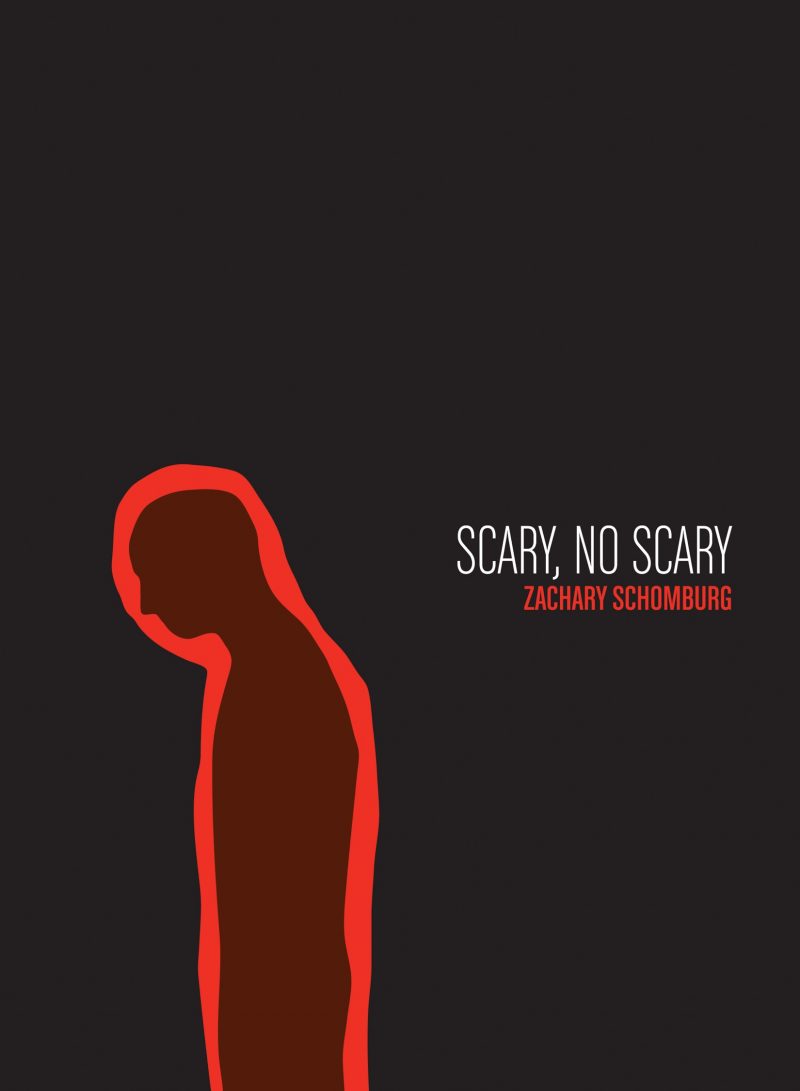On the cover of Scary, No Scary, the Portland poet Zachary Schomburg’s second and best book, there is a man. He is featureless and red and haloed in redder fire; his head is down but his back is straight. Inside the book are figures who encounter their own skeletons, who paddle about in endless ponds and wander through thousands of abandoned hotel rooms and participate in bizarre inter-epochal sex scenes; they live in poems with titles like “The Fire Cycle,” “More and More Jaguar,” and “Your Limbs Will Be Torn Off in a Farm Accident.” Surprising, then, that Scary, No Scary is best described as happy—surprising that out of chaos, darkness, fire, and violence Schomburg builds a fearlessly balanced galaxy, a cosmos inhabited by angry mobs and bleeding trees but thick with sweetness and blossoming light.
Schomburg’s themes are many: fear, of course, and death and disappearance, but also love and sex and sailboats and children and hope. His poems—most of them short, most of them fondly clever, all of them in prose or free verse—also sidestep the usual sensualities as well as most familiar forms of prosody, poeticism, and figurative language—even metaphor—in favor of a personal symbology. The world, for instance, “is the inside of the skull / of a moth / let go above the open sea.” Elsewhere, a tree is “blooming with broken hummingbirds instead of leaves.”
Stylistically speaking, the very variety of Schomburg’s interests seems almost to require a kind of sweetly askew, tamely savage allegory. But the speakers of Scary, No Scary are both semi-surrealist and only semi-serious; a voice out of “The Pond” tells us, “I can fit a number of things in my pants.” There is a certain jaunty confidence here that unifies the volume, propels the reader through its endless switching from long, narrow verse forms to fat blocks of prose, its involutions through bats and lava and dead birds and severed limbs and dying trees and the rest of the lushly macabre bric-a-brac at which Schomburg excels.
There are certain other effects, however, whose strength is their graceful reticence, their absence of jungliness. Take the last lines of “Falling Life”:
You are a brave little boy
or girl.
Very few poems end with an afterthought; one suspects that even fewer poems end with an afterthought that works, with such well-intentioned and self-defeating doofistry, to discredit them. And the total effect is uplifting, if not quite entirely: “I will not lie / It will be painful,” the same voice tells us two lines earlier. Like the volume in which it lives, though, the poem maintains an irrepressible and almost imperceptible optimism. Convention has it that ours is a fallen life, but Schomburg’s title suggests the slightly better alternative that we are all still falling.
All told, Schomburg is something like the creepy kid at the back of the bus, if the creepy kid at the back of the bus stopped you one day and silently handed you a small bird that sang to you, or a paper flower whose perfume was exactly, unobtrusively, that of your long-dead but oft-remembered grandmother. We have two choices when it comes to the kind of cockeyed grotesquerie he expresses: to shy from it, or to carefully, curiously, even gratefully accept the rare thing it offers. For to look deep into Schomburg’s weirdness is to be instructed in a soft, semi-ironical way—it is to be told, in a moment of discomfort, by a knowing stranger, that you seem brave.
You’d think I’d be scared
but I’m not scared.
That’s how Scary, No Scary ends. It’s not that easy to do, really, not in life and not in Schomburg’s poetry—but choosing not to be frightened, choosing not to frighten yourself, is one version of what he so bizarrely suggests. Only in doing so can you improve your chances of walking with your head up, without flinching, through the terrors when they do come. Off might you go, then, upright and alone and sufficient, straight-backed through the black fire and the burning scarlet blood-wet invisible rain.





